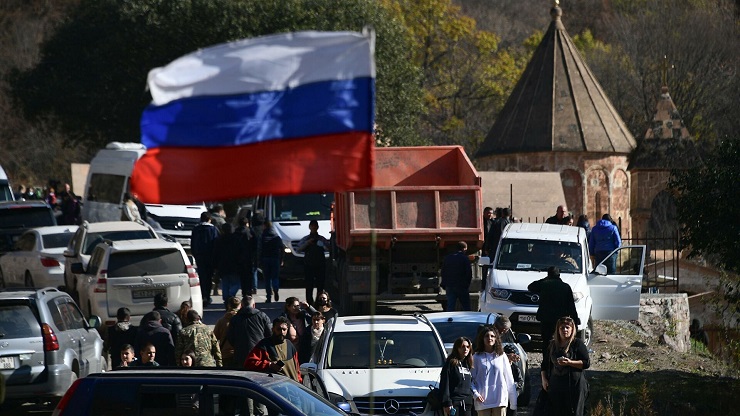The Russia brokered Nagorno-Karabakh peace agreement, which heavily borrows from Iran’s proposed strategy of looking for a solution by looking inside the region, has put Russia in the centre stage in the Caucasus. This has happened at a time when the US politics is in complete disarray and distracted, and when Joe Biden is about to take office and will be allocating more resources to make soft interventions in the region around Russia in the name of ‘strengthening democracy.’ From a geo-political point of view, Russia’s moves have given a major blow to what the US can do in the region in future. Russia, as it stands, is all out against third party interference and Western brokered solutions, which have time and again proved ineffective and unstable from Syria to Libya. This is why, instead of activating the Minsk Group, it chose to act as a mediator in its own capacity.
For all practical purposes, the deal proves that Russia’s so-called “stony path” in the region doesn’t exist, even for the American policy makers who continue to believe that Russia doesn’t have the capacity to navigate the “complexities” and that countries like Azerbaijan tend to counter-balance Russian expansionist influence through relations with Turkey and China. That Azerbaijan has accepted Russian mediation, despite Turkish military and diplomatic support, and has got a lot of territory under its control shows that the widely propagated notion of ‘Russian expansionism’ is not only unfounded but also part of a wider propaganda campaigns that corporate-funded think tanks like the Carnegie run to create a particularly negative impression of Russia to wean regional countries away from it.
The peace-deal strongly defies the conclusion drawn by the above-mentioned Carnegie report that says that “Russia’s policies in the South Caucasus and in the wider post-Soviet space have forced it back on the stony path.” The agreement, on the other hand, shows that the so-called stony path doesn’t exist. And, even if it existed, it stands fully paved now.
The deal has allowed Russia to become the guarantor of peace. This is different from a recently proposed US solution, according to which an outside force could be deployed in the Caucasus to hold the peace. It was already apparent that even for the US, the Minsk Group didn’t matter in the present conditions, allowing Russia to look inside the region for a solution that could end the conflict.
Outside interventions have, as Putin noted in some details in his recent SCO address, could only worsen the situation. To quote Putin,
“One more open challenge to our common security is the increased number of attempts of direct foreign interference in the internal affairs of states that are involved in SCO activities. I am referring to the blatant infringement on sovereignty, attempts to split societies, change the countries’ path of development and sever the existing political, economic and humanitarian ties that took centuries to develop.
“An attack of this kind has been directed by external forces against Belarus, an observer country of the SCO. Following the presidential election, our Belarusian friends have been put under unprecedented pressure and had to repel sanctions, provocations and an information and propaganda war waged against them.”
For Russia, taking the centre stage in peacekeeping in its backyard and not allowing extra-regional forces to intervene also includes checking Turkish ambitions. Therefore, despite Turkish and Azeri claims about the presence of Turkish troops in the region alongside the Russians was quickly rebuffed by Kremlin.
“Not a single word is said about this in the published statement,” Dmitri Peskov, the Kremlin spokesman, told reporters on Tuesday. “The sides did not agree on that. The presence of Turkish soldiers in Karabakh was not coordinated.”
Russia is obviously weary of Turkish tendency to insert its funded jihadi groups as its proxies to advance its interest.
As it stands, these jihadi groups have become Erdogan’s frontline soldiers in his ambitious plans to recreate a modern Ottoman empire. This Ottoman empire, while it doesn’t have any physical & territorial boundaries, is supposed to allow Turkey to set itself as a leader of the Muslim world, creating ‘Neo-Ottomanish’ ideological boundaries that extend well beyond Turkish territory.
Russia’s soft-intervention in the conflict was inevitable. It could have happened through the Minsk Group. However, the fact that Russian did this on its own (although Putin did coordinate with Macron and Erdogan) shows an increasing Russian assertiveness in the region, including its plain dismissal of any prospects of the presence of outside forces.
While Russia may still align with Turkey, allowing it to have its own forces if the latter can assure the former to evict all of the jihadi forces that it sent from Syria and Libya, there is little gainsaying that Russian foothold in the South Caucasus for the next five years will largely overshadow the presence of any other force. It is just like how the Russians, despite a heavy Turkish presence in Syria, continue to call the shots with minimum room for the Turks to manipulate things to their sole advantage.
Russia’s ability to deal with Turkey is astounding, given how, over the last five years, it has been able to achieve its own goals in situations where its interests clearly appeared to collide with Ankara. As it stands, if Ankara wants to realise some of its ambitions vis-à-vis Azerbaijan, the path indispensably goes through Moscow.
Salman Rafi Sheikh, research-analyst of International Relations and Pakistan’s foreign and domestic affairs, exclusively for the online magazine “New Eastern Outlook”.

